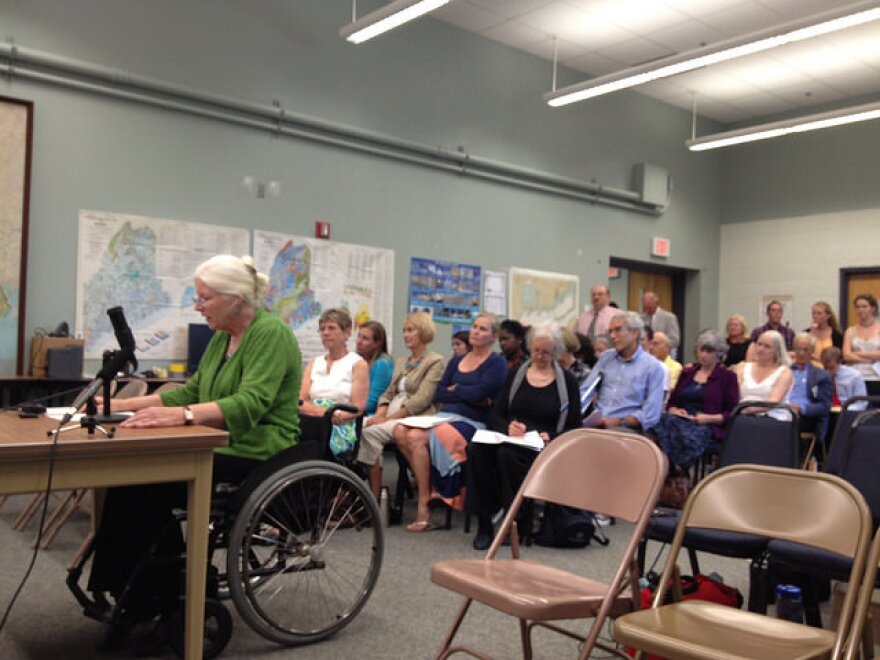AUGUSTA, Maine — The list of ingredients in cosmetics, lotions and soft vinyl plastics could soon have a new addition. The Department of Environmental Protection today took up a proposal to require manufacturers to report use of phthalates. Phthalates are hormone disrupting chemicals that can cause developmental and reproductive problems. More than 2,000 concerned Mainers say it's time consumers know what's in the products they're buying.
If you want to get a sampling of what kinds of products are likely to contain phthalates, just head to your local pharmacy, says Kathy Kilrain del Rio of the Maine Women's Policy Center.
"So we're in the aisle that has body washes, and body lotions, makeup products, and things like that," she says.
Many of these products have fragrances, a common place to find phthalates, Kilrain del Rio says. She picks up a pink bottle.
"Here is some bubble bath you might use with your kids, and I notice that it says right on it, 'fragrance,'" she says. "So there's a good chance that that's a phthalate."
Use of phthalates extend beyond the beauty aisle. They're used to soften plastics, so they can also be found in lunch boxes, vinyl notebook covers and beach balls. The problem, says Kilrain del Rio, is that most people don't know because phthalates don't have to be listed on package ingredients. But she and many other activists in Maine are hoping to change that.
A group collected more than 2,000 signatures this spring in support of a rule change that would require manufacturers to disclose their use of four specific kinds of phthalates in products. They held a rally and press conference before the public hearing on pthalates in Augusta.
"The science is clear that phthalates are harmful," says Tracy Gregoire of the Learning Disabilities Association. "We know they're lurking in products that we use every day, but we have all been left in the dark. There is simply no way to shop ourselves out of this problem."
Inside the hearing, sign up sheets to speak in favor of the proposed rule quickly filled up while sheets to speak against remained blank. Former Maine state toxicologist Deborah Rice told DEP reps that there is overwhelming scientific evidence that phthalates represent a serious threat to human health, including a recent report from the U.S. Consumer Product Safety Commission.
"Three of the phthalates under discussion, DEHP, BBP, and DEP, were previously banned in children's toys and children's care articles by Congress in 2008," she says. "The expert panel reaffirmed that these phthalates continue to pose a serious risk to human health because multiple additional sources of exposure remain unregulated."
A study last winter of 25 Maine residents from across the state found phthalates in every participant. Developing fetuses and children are most vulnerable to the chemical, which can cause birth defects in male sex organs, asthma and allergies, as well as learning and behavior problems. Pediatrician Syd Sewall says the American Academy of Pediatrics has been concerned about phthalates for more than a decade.
"This stuff is everywhere," Sewall says. "It's an incredibly useful softener for plastics. It's not tightly bound to surfaces, so it gets into the food chain — into grasses, feed grain. It gets into our crops."
Requests for comment from industry groups were not returned by air time. But on its website, the American Chemistry Council disputes the recent U.S. Consumer Product Safety Commission report, citing what it calls a flawed process. Local support for the DEP rule change includes the Maine Medical Association, and the American Lung Association of the Northeast. The Lung Association's Ed Miller says people can't wait for federal health officials to act, citing the fact that the U.S. surgeon general took too long to recognize the dangers of secondhand smoke back in 1986.
"At least 15 years after the fact that many of us knew secondhand smoke was a serious cause of cancer and disease," Miller says. "We can't wait 15 years for another surgeon general's report on this issue."
The DEP will accept public comment on the proposed phthalate rule change through September 29.



